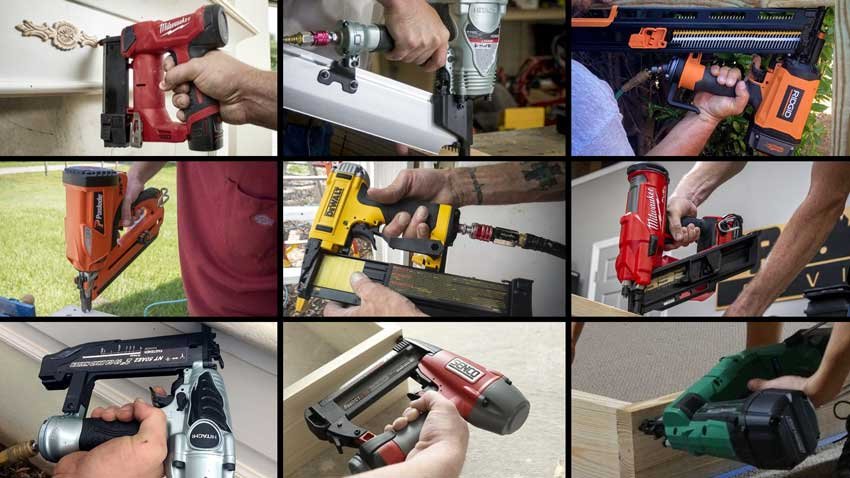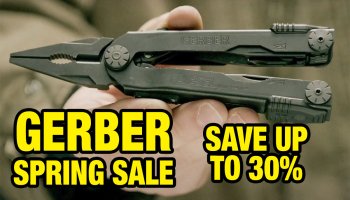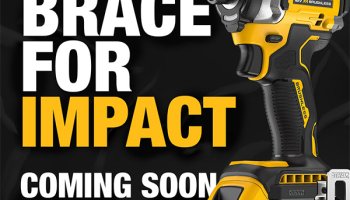
When you ask who makes the best tools, the answers vary. It’s a long-held belief around here that the manufacturer with the best cordless drill doesn’t necessarily make the best miter saw. The same can be said for each type of nailer. In fact, the best nail gun in the various categories and styles we cover brings many different manufacturers into the spotlight.
After reading through our list, be sure to leave your comments below and let us know if you differ on any of our picks.
Best Nail Gun for Framing – Pneumatic
Metabo HPT NR90AES1 Framing Nailer

If it ain’t broke, don’t fix it. Without a doubt, the best nail gun for framing has to be the Metabo HPT NR90AES1. Formerly the Hitachi NR90AES1, this is simply the lightest framing nailer we tested. We love the simple depth adjustment—which works with or without gloves. It also powers nails through the toughest materials. You get excellent visibility at the nose, quick and sure toenailing, and very little recoil.
This nailer takes nails up to 3-1/2″ x 0.148″ and has a tool-free mode change. The only crazy thing is it lacks dry-fire lockout and a rafter hook. I know, silly in this day and age, but true. We still love it and recommend it as our best pneumatic nail gun choice for framers. It has easy depth adjustment for various materials and outstanding power overall.
For the price (around $179) you’ll have a hard time beating this pneumatic framing nail gun.
We Also Recommend
- Milwaukee 7200-20 framing nailer – $229
- Ridgid R350RHF framing nailer – $229
- Max USA SN883RH3 Framing Nailer – $238
Best Nail Gun for Framing – Battery-Powered
Milwaukee FUEL 18V Cordless Framing Nailer

When it comes to pneumatic vs cordless nailers, pneumatic still wins for framing work. Still, you can definitely find some great tools for punch work. Available in both 21° and 30°, the Milwaukee M18 FUEL cordless framing nailers quickly impressed us. After testing these tools, however, the data quickly and clearly showed these nailers dominate other battery-powered tools.
While a tad heavy, they offer too many great features that tip the scales in their favor. You get zero delay on firing— even in bump mode. They consistently sink nails on every single shot, including when in rapid-fire bump mode. We even love the folding rafter hook and separate tool belt clip.
You can order an extended magazine for either model which holds 2 full sticks of nails. Most cordless nailers hold just one. Milwaukee clearly listened to its user base and made a great call there. Finally, we found the depth-adjustment easy to use, and we like the electronic switch that flips between the firing modes.
At $349 or $449 for the kit, this is the very best nail gun that runs off battery power alone.
We Also Recommend
Best Nail Gun for Framing – Gas or Fuel Cell
Paslode CF325XP Gas Framing Nailer

Though battery-powered nailers like our choice above keep getting better, the Paslode CF325XP framing nailer still finds favor among Pros. This especially holds true when it comes to punch-list work. This tool hit the market well before any of the pure battery-powered options.
We have an article on how fuel nailers work, but this tool drives its 30° nails when a small lithium-ion battery ignites a gas from a cartridge. It functions much more quickly than DeWalt and Bostitch battery-powered nailers with their firing delays. You do get a slight delay and a gas smell to put up with. Of course, there’s also the additional cost of new gas cartridges every 1200 shots or so.
Overall, the Paslode Cordless XP framer remains a popular cordless choice among Pro users. The lack of a bump-fire mode and its limited capacity makes it a tough sell as a primary tool, but it’s a capable cordless option. At $349, we still consider this the best fuel nail gun on the market.
Best Nail Gun for Finish Work – Pneumatic
Metabo HPT NT50AE2M 18 Gauge Finish Nailer

The Metabo HPT NT50AE2M 18 Gauge Finish Nailer is a solid performer. It lacks features like a dry fire lockout and swiveling air intake. That’s the trade-off you’re making for an incredible value while getting Metabo HPT’s pro performance level. This is an excellent option for Pros as their primary finish nailer.
You can’t beat the weight of this tool—just 2.2 pounds. Having used it extensively under the Hitachi moniker, the rebranded tool doesn’t disappoint. The price point also puts it squarely in the range of anyone looking for Pro-level performance. Carpenters, woodworkers, and anyone working with trim or cabinetry should love this tool.
For a bit more holding power, we also recommend:
Best Nail Gun for Finish Work – Battery-Powered
Milwaukee M18 FUEL 18-Gauge Finish Nailer

The second-generation Milwaukee M18 FUEL 18ga brad nailer improves both visibility and the rate of fire of the first-gen design. No small update, this finish nail gun truly feels and operates like a completely new tool. It provides fast firing with zero ramp-up delay. Similar to the way the Metabo HPT cordless framing nailer operates, the battery preps each shot before the tool fires. That eliminates any lag.
The tool also has a quick bump-fire mode, though we find ourselves using that less in finish work. Still, the quick firing speed should keep up with just about anyone’s needs. At $279 for the bare tool or $399 for the kit, it doesn’t come cheap. Then again, nothing good ever does.
We Also Recommend:
Best Nail Gun for Narrow Crown Stapling – Pneumatic
Senco SLS150Mg 18ga Crown Stapler

The magnesium body of the Senco SLS150Mg 18-gauge Crown Stapler makes it weigh a scant 2.6 pounds. A thumbwheel sets the depth of drive, and a simple selector switch swaps between bump fire and sequential fire modes. This finish nailer accepts 18 gauge 1/4″ crown staples that range from 1/2″ to 1-9/16″ and holds 110 fasteners. The (included!) air inlet also swivels to help avoid tangled air hoses.
You can pick up this excellent stapler for less than $100 at most retailers. The tool also comes with Senco’s 5-year limited warranty.
We Also Recommend
Best Battery-Powered Nail Gun for Narrow Crown Stapling
Milwaukee M18 FUEL Narrow Crown Stapler

Pro carpenters and tradesmen will love the Milwaukee M18 FUEL narrow crown stapler. We first got our hands on it back in 2019 and it made an impression. Like the Metabo HPT cordless framing nailer, the Milwaukee M18 Fuel 18-gauge 1/4-inch narrow crown cordless stapler has zero firing delay when you pull the trigger. Even in bump-fire mode, we saw around 4-5 staples per second. It fires almost as fast as you can move to the next location. The tool simply has no noticeable lag.
This Milwaukee M18 FUEL stapler has the power to sink 1/4-inch narrow crown staples up to 1.5-inches—even into oak or cherry. The tool also has enough adjustability so you don’t just drive through thinner materials like underlayment.
This battery-powered stapler retails for $279 as a bare tool. You can also pick it up for $399 as a kit with an M18 CP 2.0 battery and charger.
Also Recommended
Best Nail Gun for Pin Nailing – Pneumatic
DeWalt 23-gauge Pin Nailer

The DeWalt 23-gauge pin nailer really takes up the mantel from the venerable Porter-Cable PIN138 pin nailer we loved and used for years. Adding to the design, DeWalt created an exceptionally well-designed pinner that easily installs finer workpieces while eliminating the need to fill nail holes.
It’s also great for attaching small trim pieces and reducing the amount of touchup required before painting. We’ve put the finishing touches on several projects with it and found it easy to work with, lightweight, and reliable. DeWalt included a tool-free jam release—the first in a pinner as far as we’re aware. You even get a reversible belt hook and tool-free depth adjustment.
The DeWalt DWFP2350K pin nailer retails for around $149. The tool also comes with a 7-year limited warranty, 1-year free service contract, and 90-day money-back guarantee.
Best Battery-Powered Pinner
Milwaukee M12 Pin Nailer

We find it difficult not to like the Milwaukee M12 cordless pin nailer. It’s lighter and more compact than any other cordless model we’ve used. And when we say lighter and more compact—we mean it. Its performance has also been flawless to date. Though you can still go lighter with air nailers, the Milwaukee M12 23-Gauge Pin Nailer is a no-brainer switch to make as a full-time pneumatic replacement for carpentry and woodworking projects.
The Milwaukee 2540-21 pin nailer retails for around $199 as a bare tool or $249 for the kit. The cordless 12V pin nailer also includes a 3-year warranty.
We Also Like
What to Look for in a Nail Gun
Pneumatic or Battery Power
When we think about what to look for in a nail gun we start at the top. Do you want ultimate portability for smaller projects or are you looking for the lightest-weight tool possible for extended use? For now, pneumatic nail guns still beat battery-powered models by a long shot. If you want a lightweight tool, grab a compressor and get going.
For framers and roofers, the choice is obvious. Pneumatic tools still have a clean edge and provide the smoothest, most consistent work experience. When you get down to punch lists, however, things begin to change. Now, battery-powered tools begin to gain in. their practicality and convenience. We know several roofing crews who employ the DeWalt cordless roofing nailer for repairs. It speeds up setup and tear down.
Switching Firing Modes
For framing nailers and roofing nailers, switching firing modes used to be a real hassle. Even the best nail guns at the time required you to swap out triggers to change modes. Now, most tools have some form of tool-free mode change. Some companies do it using a slide switch or button near the trigger. Several battery-powered models use electronics to control the mode.
In either case, if you often switch between bump-fir and sequential firing modes, be sure the tool you get makes it easy to go back and forth.
Other Features
Most nailers are catching on. Few miss any important features anymore. Still, make sure you’re getting what you need. In addition the firing mode switch above, look for dry fire lockout. That keeps you from firing “blanks” when you run out of nails. It can be frustrating at best. At worst, it can damage the material you’re working on by creating the impression of a nail—without actually firing a nail.
We also want to see adjustable rafter hooks on larger tools like framing nailers. For roofing nailers not so much. And for finish nailers we care more about a belt hook for convenience.
On tools where you’re likely to be in a variety of positions behind the nailer, adjustable exhaust vents help out. I remember getting blown in the face repeatedly by a non-adjustable nailer when doing some siding work several years back.
Swivel Me This
Aside from that, be sure to buy swiveling 1-4″ NPT fittings for your nail guns. These make maneuvering around a hose so much easier. We carry a pile of them and put them on every tool when it comes in. A few nailers include them by default—but only a few. It doesn’t influence our decision or ratings on tools, but it’s a great tip to pass along.
Weight and Ergonomics
It cannot be overstated how important weight is to nail guns. The best nail guns have tons of power. They just don’t look like they have tons of power. One great example is the difference between the cordless flywheel system used by DeWalt vs the gas piston system Metabo HPT, Senco, and Milwaukee Tool employ. Line those tools up and you can quickly see that the DeWalt head looks gigantic in comparison.
Price and Value
Price matters. After all, if you don’t intend to use a tool every day, you may not need to spend as much. All things being equal—if it drives the nail, you can get the job done. With that said, quality matters and so we recommend taking everything into account when trying to understand both the price and value of a particular tool.
The value a tool offers will be different for everyone depending on what you prioritize the most: features, performance, or price. Regardless, it’s the sum of what you get compared to the price you pay that determines the value for you. That’s how we look at things and it really influences our ultimate recommendations.
Ever check out a “review” site and you can’t tell if they actually tested the tools or if they’re just “recommending” the Amazon top sellers? That’s not us. We won’t recommend anything unless we’d actually use it ourselves and we don’t really care who the primary retailer is. It’s all about giving you a legitimate recommendation and our honest opinion of each product.
We’ve been in business since 2008 covering tools, writing reviews, and reporting on industry news in the construction, automotive, and lawn care industries. Our Pro reviewers work in the trades and have the skills and experience to know whether tools can perform well in the field.
Each year, we bring in and review more than 250 individual products. Our team will put our hands on hundreds of additional tools at media events and trade shows throughout the year.
We consult with innovators in the technology and design of tools to gain a broader grasp of where these products fit and how they work.
We work with more than two dozen professional contractors around the United States who review products for us on real job sites and consult with us on testing methods, categories, and weighting.
The end result is information you can trust because of the editorial, scientific, and real-world professional experience we collectively utilize each and every time we pick up and test a tool.






